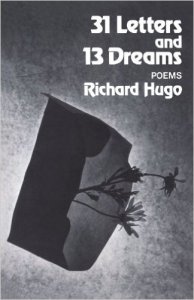Richard Hugo’s 31 Letters and 13 Dreams
Missives about real places and authentic people

I’m not a poet. Perhaps then I have the freedom to enjoy poems without overanalyzing them. Early in my writing life, I stumbled upon a small book by the poet Richard Hugo titled 31 Letters and 13 Dreams. I loved the letters—a type of free verse, more like conversations with a good friend.
Hugo’s work spoke of real places and authentic people, about everyday emotions and the working class. Simple. Not complex literature. His was a voice I understood and sought to discover for myself. If I was lucky, maybe my stories could be as honest as his.
I grew up a simple farm kid and did not read a lot. I never thought I’d write professionally. My stories were often quiet and subtle or poorly imagined and sounded like bad Country Western songs.
But like Hugo’s Letters (many of them set in his homeland of Montana), my work tended to focus on landscape, the meeting of the external natural world with the internal world of life. Farming, family, history, culture, and community all jumbled together—stories can help us sort them out, much like a good letter to a friend or family member.
I long for personal exchanges. Great conversations like letters that stay with you—partly private and yet public, a little confessional but also probing and exploring, simple and direct. Like sharing secrets that carry meaning, whispers that bring silence to life and expose us to the real, everyday world. We can all benefit from this dialogue and communion.

